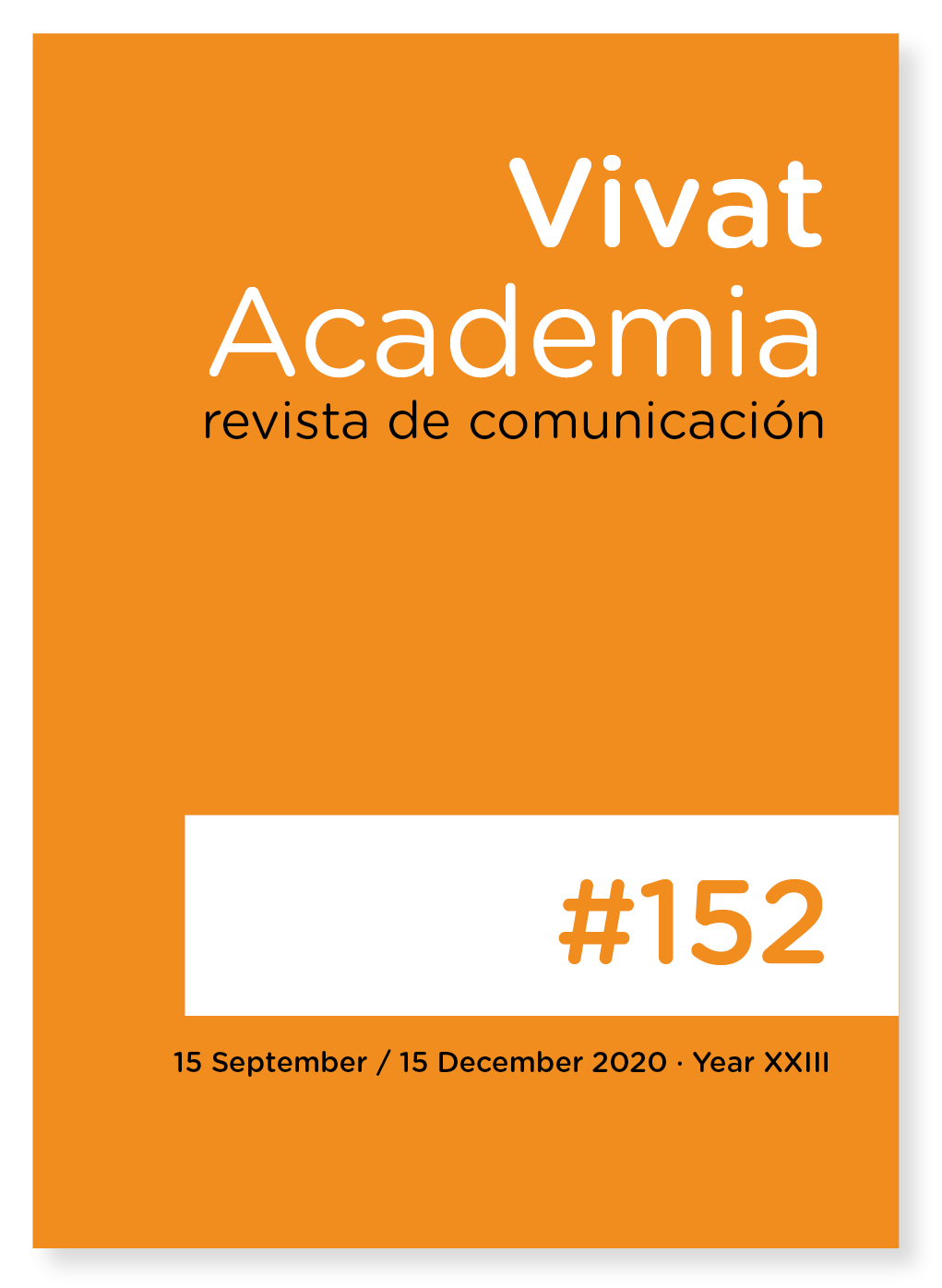Hashtag politics in Twitter
Main Article Content
Abstract
This paper on political communication in Twitter presents and discusses the results of a comparative pragmalinguistic analysis of a corpus of hashtags, included in the tweets published in their own profile by five Spanish political leaders from April 12 to November 8, 2019. Within this period of almost 8 months, two general elections, the elections to the European Parliament, and several regional and local electoral appointments took place in Spain. This quantitative and qualitative study aims at delving into the impact that this device has on political discourse in social network sites, identifying the formal and content similarities and differences that it presents in the messages of the leaders considered, and pointing out the discursive functions that it has in such messages. The main objective is determinining whether hashtags are mechanisms of innovation in current political communication. The results show that there are relevant differences regarding the number of hashtags used by each politician. However, from a formal and a functional point of view, they are used similarly with the functions of persuading the voter, like a slogan, and summing up and contextualizing the content of the tweet. At the same time, the hashtag implicitly invites the leaders’ followers to support and viralize the political message.
Downloads
Article Details
References
Briceño Romero, Y.; Calderón-Benavides, L.; Manrique, J. A. y Gélvez Salazar, C. (2019). Twitter en tiempos electorales. Una revisión de #ColombiaDecide, en Anuario Electrónico de Estudios en Comunicación Social, 12(2), pp. 216-236.
Calvo Rubio, L. M. (2018). Twitter como segunda pantalla en los debates políticos en televisión. Análisis de la etiqueta #L6Nrajoyrivera, en Icono 14, 16(1), pp. 160-184.
Escuder, S. (2019). Política en las redes, redes en la política: estudio de caso de la campa¬ña #VivirSinMiedo, en Teknokultura. Revista de Cultura Digital y Movimientos Sociales, 16(1), pp. 55-74.
Gallardo Paúls, B. y Enguix Oliver, S. (2016). Pseudopolítica: el discurso político de las redes sociales. Valencia: Universitat de València.
Garrido Lora, M. (2013). Estudio comparativo de los eslóganes electorales y comerciales: el caso de las elecciones generales españolas de 2008, en Convergencia, 20, pp. 173-192.
González Bengoechea, A. (2015). Redes sociales y política: El uso comunicativo de Twitter por parte de los principales partidos políticos, en Fòrum de recerca, 20, pp. 539-555.
Heyd, Th. y Puschmann, C. (2017). Hashtagging and functional shift: Adaptation and appropriation of the #, en Journal of Pragmatics, 116, pp. 51-63.
Held, G. (2011). Il testo breve: condensazione multimodale nella comunicazione di massa. En Held, G. y Schwarze, S. (Eds.), Testi brevi: teoria e pratica della testualità nell'era multimediale (pp. 15-30). Frankfurt am Main: Peter Lang.
López Eire, A. (1998). La Retórica en la publicidad. Madrid: Arco Libros.
Mancera Rueda, A. y Helfrich, U. (2014). La crisis en 140 caracteres: el discurso propagandístico en la red social Twitter, en Cultura, Lenguaje y Representación, Vol. XII, pp. 59-86.
Mancera Rueda, A. y Pano Alamán, A. (2013). El discurso político en Twitter. Barcelona: Anthropos.
Mancera Rueda, A. y Pano Alamán, A. (2015). Valores sintáctico-discursivos de las etiquetas en Twitter, en Círculo De Lingüística Aplicada a La Comunicación, 64, pp. 58-83.
Menna, L. (2012). Nuevas formas de significación en red: el uso de las #etiquetas en el movimiento 15M, en Estudios de Lingüística del Español, 34. Recuperado de: http://elies.rediris.es/elies34/Tesina_L-Menna.pdf. Última consulta: 24-07-2014.
Ortega, F. (2005). La fragmentación de la legitimidad política, en Revista Mexicana de Ciencias Políticas y Sociales, 47, Vol. 194, pp. 13-32. Recuperado de: http://revistas.unam.mx/index.php/rmcpys/article/view/42483/38599
Page, R. (2012). The linguistics of self-branding and micro-celebrity in Twitter: the role of hashtags, en Discourse Commun, 6, pp. 181-201.
Pano Alamán, A. (2019). Condensación y fragmentación del discurso político en Twitter. En Pellisser Rosell, N. y J. Oleaque Moreno (eds.) (2019). Mutaciones discursivas en el siglo XXI: la política en los medios y las redes (pp. 75-92). València: Tirant lo Blanch.
Pano Alamán, A. y Mancera Rueda, A. (2014). La ‘conversación’ en Twitter: las unidades discursivas y el uso de marcadores interactivos en los intercambios con parlamentarios españoles en la red social, en Estudios de Lingüística del español, 35.1, pp. 234-268. Recuperado de: http://infoling.org/elies/35/elies35.1-10.pdf
Pellisser Rosell, N. y Oleaque Moreno, J. M. (Eds.) (2019). Mutaciones discursivas en el siglo XXI: la política en los medios y las redes. València: Tirant lo Blanch.
Peña Jiménez, P. y Ortiz Sobrino, M. (2011). El eslogan político español en la campaña de elecciones generales de 2008, en Estudios sobre el Mensaje Periodístico, 17(2), pp. 549-568.
Pérez Fumero, E. (2013). La enfermedad de Hugo Chávez en la agenda de medios públicos. Análisis del hashtag #elmundoestaconchavez* desde la teoría del framing, en index comunicación, n. 3, pp. 63-85.
Reboul, O. (1978). El poder del eslogan. Valencia: Fernando Torres.
Santoveña, S. (2015). CiberSociedad y debate público en 140 caracteres: #paro y #corrupción, en Athenea Digital, 15(3), pp. 47-84. Recuperado de:
Scott, K. (2015). The pragmatics of hashtags: Inference and conversational style on Twitter, en Journal of Pragmatics, 81, pp. 8-20.
Zappavigna, M. (2011). Ambient affiliation: a linguistic perspective on Twitter, en New Media Society, 13(5), pp. 788-806.
Zeifer, B. (2020). El hashtag contestatario: cuando los hashtags tienen efectos políticos, en Dígitos. Revista de Comunicación Digital, 6, pp. 101-118.





